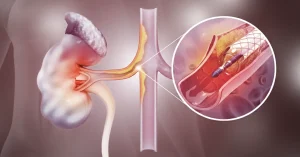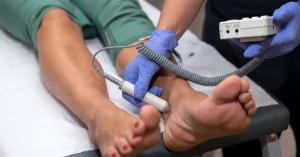Conditions Treated
Vascular diseases
Complex Vascular Diseases
- Aortic dilatation and other aortic pathologies
Interventional Vascular Procedures
- Aortic Stent Graft Implantation
- Peripheral Artery Angioplasty
- Renal artery angioplasty
- Angioplasty and Stenting for Arterial Ischemia
- Aortic Aneurysm / Treatment Dilated Aorta
- Vascular embolization for dysfunction
- Mesenteric Artery Angiography and Angioplasty
- Venous Angioplasty

Heart diseases often develop quietly without obvious symptoms, yet they can pose serious risks if left undetected.
At VenArt Clinic, we offer comprehensive cardiology evaluations using advanced technology and performed by experienced specialists to ensure thorough assessment and care for every patient’s heart health.
What Does a Complete Cardiology Consultation Involve?
A cardiology consultation goes beyond a simple doctor’s visit. It involves a detailed evaluation of the heart and vascular system to detect, prevent, and monitor cardiovascular diseases. This thorough assessment is essential to maintain heart health and catch potential problems early. During your visit, the cardiologist will conduct several important steps:
Medical History Review
The doctor will discuss any symptoms you have experienced, such as chest pain, irregular heartbeat, dizziness, shortness of breath, or fatigue. They will also inquire about your personal and family medical history including chronic illnesses, previous surgeries, medications, and lifestyle habits like diet, exercise, smoking, and alcohol intake. This helps identify risk factors such as high blood pressure, diabetes, or high cholesterol.
Physical Examination
The cardiologist will listen to your heart and lungs with a stethoscope, checking for abnormal heart sounds, irregular rhythms, or signs of lung congestion. Blood pressure and pulse will be measured, sometimes on both arms. They will also palpate pulses in the neck, wrists, and legs and look for swelling in the lower limbs, which can indicate cardiovascular issues.
Echocardiography (Heart Ultrasound
This non-invasive test provides real-time images of the heart’s structure and function. It evaluates heart size, pumping efficiency, valve operation, presence of fluid around the heart, and blood flow patterns.
Pulse Oximetry
Measures oxygen saturation in the blood to assess respiratory and cardiovascular function.
Electrocardiogram (ECG)
A quick and painless test that records the heart’s electrical activity. It can detect arrhythmias, ischemia, or other abnormalities and is a standard part of cardiology evaluations.
Additional Tests (Recommended If Needed)
Depending on initial findings, further tests may be recommended:
- Stress Test: Assesses heart performance during exercise on a treadmill or stationary bike while continuously monitoring the ECG. This helps diagnose coronary artery disease and evaluates functional capacity.
- Holter ECG Monitoring: A portable device worn for 24 hours or longer to record heart electrical activity over time, detecting intermittent rhythm disturbances not seen during a resting ECG.
- Ambulatory Blood Pressure Monitoring: Records blood pressure periodically over 24 hours to provide a detailed profile and evaluate treatment response.
- Blood Tests: Includes cholesterol levels (HDL, LDL, triglycerides), blood sugar, inflammatory markers, kidney and liver function tests, and electrolytes.
- Vascular Doppler Ultrasound: Examines arteries and veins, such as carotid or peripheral vessels, for narrowing or blockages.
When Should You See a Cardiologist?
Consult a cardiologist if you experience any of the following:
- Chest pain, palpitations, dizziness, or shortness of breath;
- Excessive fatigue from minimal exertion;
- High blood pressure or an enlarged heart diagnosis;
- Family history of heart attack, stroke, or heart failure;
- Need for cardiovascular monitoring due to chronic treatment or risk factors.
Conditions We Diagnose and Monitor
At VenArt Clinic, we use advanced technology and techniques to manage a wide range of cardiovascular conditions including:
- Hypertension;
- Coronary artery disease;
- Arrhythmias such as tachycardia and atrial fibrillation;
- Cardiomyopathies;
- Heart failure;
- Valve diseases.
If tests indicate peripheral artery disease, we also investigate vascular conditions such as:
What Happens After the Consultation?
After completing all necessary investigations, your cardiologist will combine test results, ultrasound, ECG, and your personal discussion to provide a clear diagnosis and design a personalized plan. Depending on the findings, you may receive:
- Practical lifestyle recommendations including dietary guidance, exercise routines, stress reduction, smoking cessation, weight management, and sleep improvement. These changes can significantly impact your heart health.
- Medication or other treatment options tailored to your specific condition and needs.
- A monitoring plan with clear instructions on follow-up visits to keep your cardiovascular health under control.
A complete cardiology consultation is crucial for early diagnosis and effective management of heart diseases and greatly contributes to maintaining your cardiovascular health.
Why choose VenArt Clinic?
Your heart health is too important to leave to chance. At VenArt Clinic, several key factors make us the right choice for your care:
- Multidisciplinary Team With International Experience
Our team brings together experts in cardiology, angiology, and vascular surgery who collaborate closely to determine the best treatment options for you. Our doctors combine local knowledge with advanced training from top medical centers in Europe and the United States. - State-of-the-Art Technology
We employ the latest diagnostic tools and treatment technologies to ensure every examination and procedure is accurate, efficient, and minimally invasive, reducing discomfort and recovery time. - Personalized Approach
We understand that each patient’s situation is unique. Our specialists take time to listen and tailor treatment plans to your specific medical needs and lifestyle goals, working with you to create a realistic and effective care strategy. - Guaranteed Safety and Efficiency
VenArt Clinic follows strict medical protocols and quality standards. This commitment is evident in the positive outcomes we achieve and the confidence our patients place in our care.
Medical Team
Frequently Asked Questions
What is cardiology?
Cardiology is the branch of medicine that focuses on the prevention, diagnosis, and treatment of heart and cardiovascular system disorders. This includes conditions such as high blood pressure, coronary artery disease, heart failure, and arrhythmias.
What does cardiology mean?
A branch of medicine that deals with the prevention, diagnosis, and treatment of diseases of the heart and blood vessels.
What tests are done for cardiology?
ECG, echocardiography, stress test, Holter monitoring, blood tests (cholesterol, triglycerides, cardiac enzymes).
What are the most common heart diseases?
Some of the most common heart conditions include:
- Coronary artery disease (narrowing of the coronary arteries);
- Heart failure (the heart’s inability to pump blood effectively);
- Arrhythmias (abnormal heart rhythms);
- Hypertension (high blood pressure);
- Valvular heart disease (damage to the heart valves).
What symptoms should prompt me to see a cardiologist?
Symptoms that should prompt you to see a cardiologist include:
- Chest pain or discomfort
- Palpitations or irregular heartbeat
- Shortness of breath, especially during physical activity
- Dizziness or fainting
- Unexplained excessive fatigue
- Swelling of the legs, ankles, or abdomen
What does SIV mean in cardiology?
Interventricular septum – the wall that separates the heart’s ventricles; the IVS can have defects (VSD), most often congenital.
What risk factors contribute to vascular diseases?
The main risk factors include:
- Smoking;
- High blood pressure;
- High cholesterol;
- Diabetes;
- Obesity;
- Lack of physical activity;
- Family history of heart disease;
- Excessive stress.
What is cholesterol and how does it affect the heart?
Cholesterol is a fatty substance essential for the body, but high levels can lead to deposits on the walls of arteries, narrowing them and increasing the risk of coronary disease and heart attack.
How often should I have a cardiology check-up?
The frequency of check-ups depends on age, risk factors, and medical history. People over 40 or with risk factors should have an annual check-up. The cardiologist will determine an appropriate schedule for each patient.
What is a heart attack and what are its symptoms?
A heart attack, or myocardial infarction, occurs when blood flow to a part of the heart is blocked, leading to damage of the heart muscle. Symptoms include:
- Severe chest pain that may radiate to the left arm, neck, or jaw.








